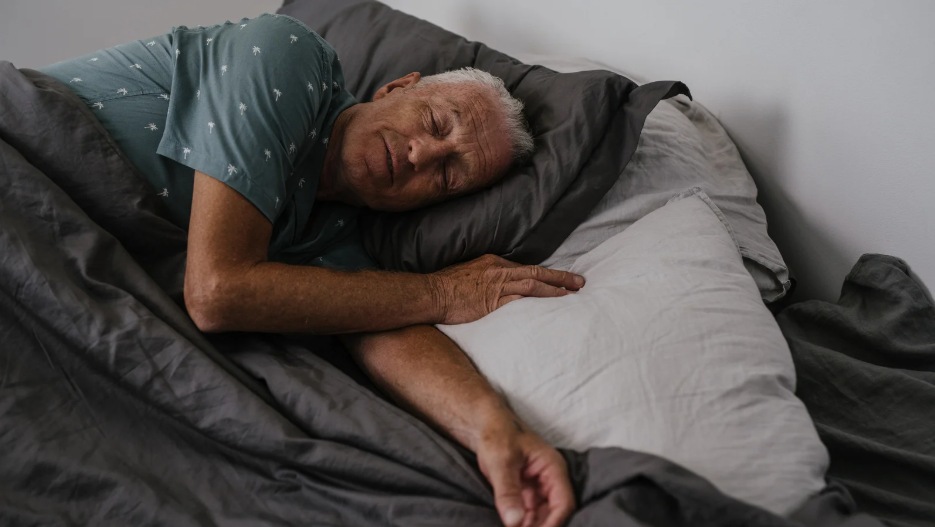Sleep is essential for our health and well-being.
It helps our bodies recover, boosts our mood, and improves our ability to think clearly. Unfortunately, many people struggle with getting enough good-quality sleep. 62% of all Americans experience a sleep problem several nights a week—and it is likely those numbers are low–sleep problems often go under-reported.
Physical therapists often see how physical health can impact sleep. Here is how your therapist can help you sleep better, along with some tips for improving your sleep habits.
Why Sleep Matters
Good sleep is crucial for several reasons:
- Physical Health: Sleep helps your body heal and repair itself. It supports your immune system, making you less likely to get sick.
- Mental Clarity: Lack of sleep can lead to trouble concentrating and making decisions. A good night’s sleep helps your brain function at its best.
- Emotional Well-Being: Sleep affects your mood. Poor sleep can lead to irritability and increased stress, while good sleep promotes a positive outlook.
How Physical Therapists Can Help
Physical therapists can play a key role in improving your sleep through various strategies:
1. Assessing Physical Pain
Many people have trouble sleeping because of pain or discomfort. A physical therapist can help identify the source of your pain, whether it is from an injury, chronic condition, or poor posture. By developing a plan to address these issues, we can help reduce pain, making it easier for you to sleep. This one also works both ways – not sleeping enough has been shown to make you more sensitive to pain.
2. Promoting Relaxation Techniques
Physical therapists can teach you relaxation techniques, like deep breathing, gentle stretching, or progressive muscle relaxation. These methods can help calm your mind and body, making it easier to fall asleep.
3. Creating a Personalized Exercise Plan
Regular physical activity can improve sleep quality. A therapist can create a tailored exercise program that suits your needs and lifestyle. Gentle exercises, especially those done in the evening, can help you unwind and prepare for sleep.
4. Improving Sleep Environment
Your physical therapist can also offer advice on creating a better sleep environment. This includes tips on your mattress, pillows, and bedroom setup to ensure you have a comfortable place to sleep.
Tips for Better Sleep
In addition to working with your PT, here are a few steps you can take to improve your sleep:
- Stick to a Schedule: Go to bed and wake up at the same time every day, even on weekends.
- Limit Screen Time: Reduce exposure to screens at least an hour before bed. The blue light from screens can interfere with your ability to fall asleep.
- Create a Bedtime Routine: Establish a calming routine before bed, such as reading or taking a warm bath.
- Watch Your Diet: Avoid large meals, caffeine, and alcohol close to bedtime. These can disrupt your sleep.
- Keep Your Bedroom Dark and Cool: A dark, cool room can help signal to your body that it’s time to sleep.
Conclusion
Sleep is vital for our overall health, and physical therapists can help you achieve better sleep through pain management, relaxation techniques, and personalized exercise plans. By combining our expertise with your commitment to good sleep habits, you can enjoy the restful nights you deserve. Remember, a good day starts with a good night’s sleep, so start your days right with the help of physical therapy today!
References
- Siengsukon CF, Al-dughmi M, Stevens S. Sleep health promotion: practical information for physical therapists. Phys Ther. 2017;97(8):826–836. doi:10.1093/ptj/pzx057.
- Nijs J, Mairesse O, Neu D, et al. Sleep disturbances in chronic pain: neurobiology, assessment, and treatment in physical therapist practice. Phys Ther. 2018;98(5):325–335. doi:10.1093/ptj/pzy020.
- A survey of physical therapists’ perception and attitude about sleep. J Allied Health. 2015;44(1). Available at: https://www.ingentaconnect.com/content/asahp/jah/2015/00000044/00000001/art00008.
- Siengsukon CF, Boyd LA. Does sleep promote motor learning? Implications for physical rehabilitation. Phys Ther. 2009;89(4):370–383. doi:10.2522/ptj.20080310.
- American Physical Therapy Association. PT’s role in sleep education. APTA News. August 8, 2017. Available at: https://www.apta.org/news/2017/08/08/from-ptj-pts-should-wake-up-to-their-role-in-promoting-sleep-health.
- PT Progress. Can PT help you sleep better? Available at: https://www.ptprogress.com/sleep-physical-therapy/.
What makes us different? Our care comes to you!
View Our Service AreaWe Are A Comprehensive Mobile Company Focused on Wellness, Fitness, Rehabilitation, and Prevention
We specialize in transforming the lives of seniors, adults and teenagers with a wide array of diagnoses and conditions in their home or location of choice. You deserve to be your best self through good health and wellness. We would love to have the privilege to work with you or a loved one.
Request a FREE Consultation Today!
